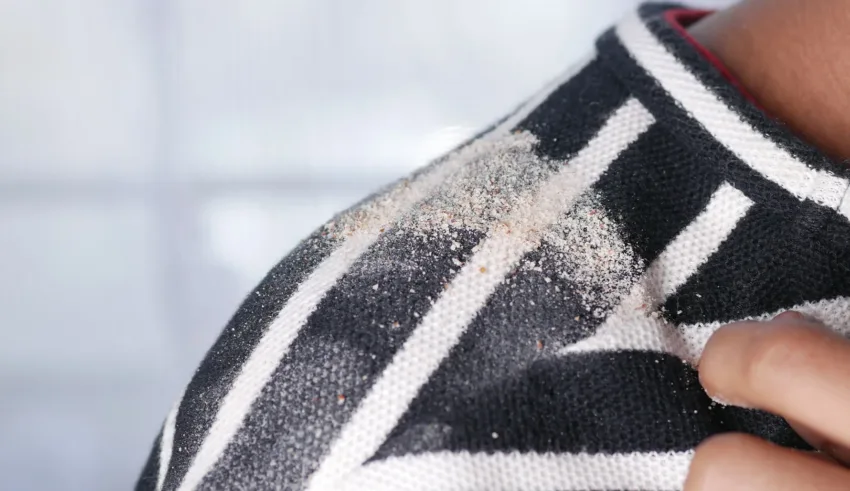
Flakes of doubt, an itchy scalp, and a persistent battle against self-consciousness – welcome to the world of dandruff distress. For many individuals, dandruff is more than just a harmless scalp condition; it becomes a source of embarrassment, low self-esteem, and a constant struggle to regain confidence. The impact goes beyond visible dandruff, infiltrating one’s emotional well-being and self-image. But fear not, as this article from The Dermo Lab delves into the heart of dandruff’s effects, revealing how to tackle the embarrassment head-on and reclaim your self-esteem. It’s time to banish the stigma, explore effective solutions, and embrace a dandruff-free future.
What is the emotional toll of dandruff?
While dandruff may seem like a purely physical concern, its impact on your emotional well-being should not be underestimated. The presence of dandruff can lead to dandruff distress, causing embarrassment, self-consciousness, and a decline in self-esteem. Here are some common psychological effects associated with dandruff:
- Embarrassment and self-consciousness: Dandruff often manifests itself as visible white flakes on the scalp and hair, which can be embarrassing for individuals. Fear that others will notice and pass judgment on dandruff can lead to embarrassment and constant worry about one’s appearance.
- Social anxiety and isolation: The embarrassment caused by dandruff can trigger social anxiety, making people reluctant to participate in social activities or engage in conversations. They may feel the need to avoid situations where their dandruff may be visible, leading to feelings of isolation and fewer social interactions.
- Negative body image: Dandruff can contribute to a negative body image, as people may perceive the condition of their scalp as a flaw or imperfection. This negative self-perception can affect overall body image and contribute to lower self-esteem.
- Reduced self-confidence: Constant preoccupation with the appearance of dandruff can erode self-confidence. People may feel self-conscious in professional situations, such as job interviews or presentations, and their performance may be affected by the preoccupation with their dandruff.
- Impact on personal relationships: Dandruff-related distress can also affect personal relationships. People may feel anxious in intimate situations, fearing that their partner will notice or be disgusted by dandruff. This can lead to strained relationships and hinder emotional bonding.
- Impaired professional development: In the workplace, dandruff can create a negative perception, potentially affecting career prospects and professional advancement. The fear of being judged on one’s appearance can undermine self-confidence and prevent individuals from showcasing their skills and talents.
It’s important to recognize that the psychological effects of dandruff are valid and can have a significant impact on an individual’s well-being. Tackling these effects and finding effective strategies to manage dandruff can help individuals rebuild their self-esteem and regain their confidence.
How to combat the significant psychological effects on self-esteem?
Combating the emotional burden of dandruff and its impact on self-esteem requires a holistic approach that addresses both the physical symptoms and the psychological effects of dandruff distress. Here are some strategies to help combat the emotional burden of dandruff and boost self-esteem:
1- Education and awareness: Learn about dandruff, its causes, and possible treatments. Understanding that dandruff is a common condition can help normalize it and reduce feelings of shame or embarrassment.
2- Adopt good scalp hygiene: Follow a regular hair and scalp care routine that includes gentle cleansing and exfoliation. Use anti-dandruff shampoos containing active ingredients such as zinc pyrithione, selenium sulfide, or ketoconazole to manage the flaking and itching associated with dandruff. When shampooing, massage your scalp with your fingertips in light circular movements. This loosens and removes dead cells and dandruff. Avoid scratching or using your fingernails, as this can irritate the scalp and potentially aggravate dandruff.
Our choices of anti-dandruff shampoos :
For oily dandruff:
Ducray Squanorm Anti-Dandruff Treatment Shampoo – Oily Dandruff
For dry dandruff:
Ducray Squanorm Anti-Dandruff Treatment Shampoo – Dry Dandruff
For dandruff caused by seborrheic dermatitis:
Ducray Kelual DS Treatment Shampoo
3- Manage stress: Stress can aggravate dandruff symptoms and have an impact on your emotional well-being. Implement stress management techniques such as mindfulness meditation, deep breathing exercises, yoga, or taking up hobbies that help you relax. This can improve your overall mental health and reduce the emotional impact of dandruff.
4- Cultivate self-compassion: Practice self-compassion by treating yourself with kindness and understanding. Instead of criticizing yourself for having dandruff, remember that it’s a common condition that can be managed. Focus on your positive qualities and achievements to counteract your negative self-perception.
5- Surround yourself with support: Seek support from friends, family, or self-help groups who can encourage and understand you. Sharing your experiences and feelings with others who have experienced similar difficulties can help ease the emotional burden and give you a sense of community.
6- Focus on your general well-being: Take part in activities that promote your general well-being, such as regular exercise, a balanced diet, and quality sleep. Taking care of your physical and mental health can have a positive impact on your self-esteem and emotional resilience.
7- Practice positive affirmations: Counter negative thoughts and beliefs with positive affirmations. Remind yourself of your worth, your inner beauty, and your strengths. Repeat affirmations that reinforce self-acceptance and self-love.
8- Seek professional help: If the emotional burden of dandruff becomes overwhelming and has a significant impact on your mental health and self-esteem, consider therapy or counseling. A mental health professional can provide advice, support, and techniques to help you overcome the emotional difficulties associated with dandruff.
Conclusion
Remember that dealing with the emotional consequences of dandruff takes time and patience. It’s important to be consistent with your self-care routine, seek support where necessary, and practice self-compassion throughout the journey. By addressing both the physical and psychological aspects, you can gradually regain your self-esteem and confidence in your own skin.
Last Updated on March 26, 2024












